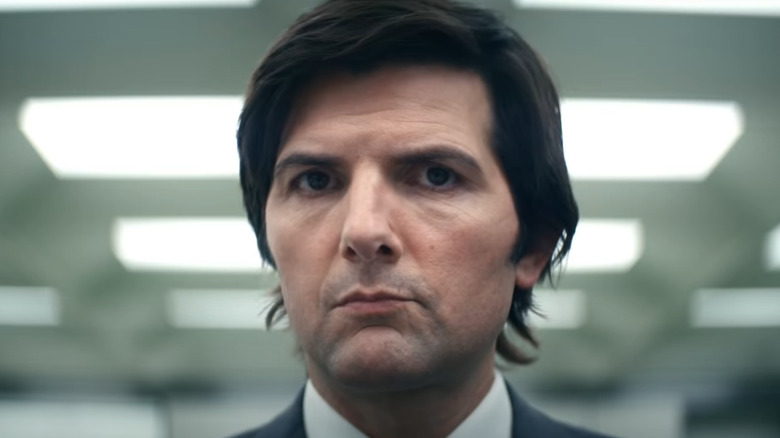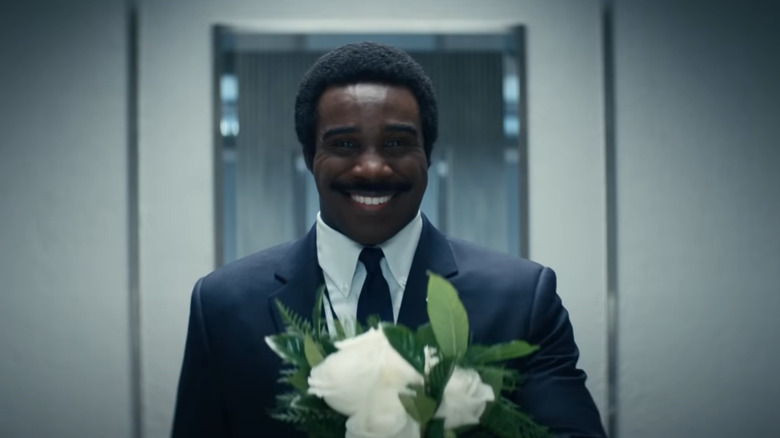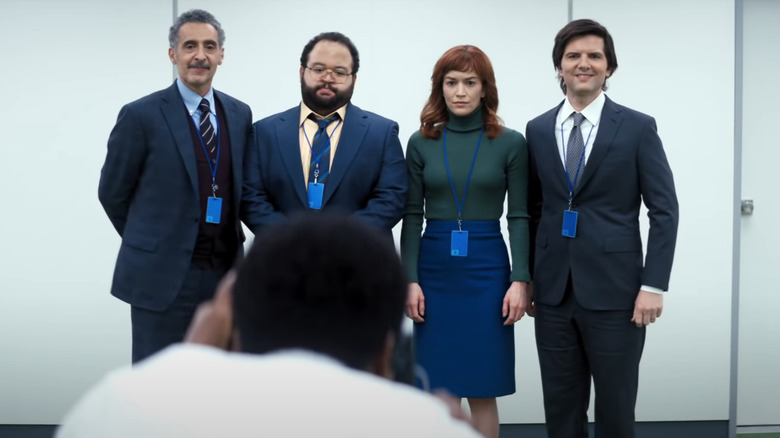The World Of Severance Was Inspired By A Very Relatable Real-Life Pain
While everyone's still recovering from that intense season finale, "Severance" has, by the grace of God (well, Apple), begun production on season 2. That means all our questions that remain unanswered will soon be addressed. In the meantime, we're all left to reflect on the deep and unsettling insights writer/creator Dan Erickson has provided on the show's first nine episodes.
The man behind "Severance" came out of relative obscurity to hit us all, world-weary as we were following two years of a global pandemic, with some profound questions. The show tackled everything from our relationship to corporate culture and its relentless focus on productivity to how grief can permeate all facets of our existence and what it means to live with it.
Erickson, who previously worked with digital comedy production house Super Deluxe, has spoken about being inspired by movies such as "The Matrix" and "The Truman Show," and even cited Mike Judge's cult comedy "Office Space" as an influence on his Apple TV+ series. But there was a lot more that went into crafting the eerily familiar tone of Lumon Industries, the monotony faced by its Macrodata Refinement Team, and the enforced fun of the compulsory dance social.
'I wasn't important in any way'
By the end of "Severance" season 1, the extent of Lumon's exploitation of its staff has become all too clear. The "severed" employees at Lumon — those who have opted in for a procedure that ensures they remember nothing about their work day when they leave and vice versa — are repeatedly subjected to all manner of degrading experience. From the "compunction statement" they're forced to read for hours by Tramell Tillman's Milchick to the flat-out lies being told to Adam Scott's Mark S., it's all beyond sinister.
All of this seems to have been inspired by Erickson's experience working temp office jobs in LA. Speaking to Esquire, the writer/creator said that when he first moved to the city, he was somewhat stunned to go from the nurturing college experience to the bland and uncaring environment of corporate America. "I wasn't important in any way," he said. "Just working temporary office jobs ... In those hours on the job, I was resentful of not being in a grander place in life."
Beyond that experience of office life, Erickson was going through a "really hard breakup of a five year relationship," which seems to have manifested in the show as Mark S. grieving his wife, Gemma. It's this breakup that seems to have made "Severance" more than just a show about skewering corporate life. As Erickson explained, the breakup forced him to confront the fact that his temp jobs were providing him with a way of completely zoning out so as to not think about his personal circumstances:
"There was a sense of escape to it ... When you're going through a complicated or painful time, sometimes all you want is to shut off your brain for eight hours and input data."
Severance isn't all that different from our own lives
With 14 Emmy nods and two wins, Erickson's astute observations seem to have resonated. And in the age where Elon Musk is telling Twitter workers to work "long hours at high intensity" and that "only exceptional performance will constitute a passing grade," it's easy to see why. So many have experienced the effect of being at the behest of cult-like corporate conglomerates and the kind of personality-numbing that comes with life in a cubicle. As Erickson put it, we've all watched ourselves "adopt slightly different mannerisms" at work while asking "What is wanted from me here?"
The events of "Severance" are, of course, an exaggerated version of this experience, but what gives the show a truly unsettling undertone is that it doesn't seem all that exaggerated. Erickson maintained that while "Adam is playing such a beautifully, exquisitely different version of the character when he's the innie versus the outie ... I don't think the change is much more marked than what most people do when they're at work." The fact that the show built its whole look around a real-life place –- the Bell Labs Holmdel Complex in New Jersey –- is further testament to it being a little too close to the real-world for comfort. And with Erickson set to continue writing on the second season, there'll be plenty of disturbing reflections of our own lives to "shut off our brains" to as we embrace the sweet severance that comes with the binge-watch.


